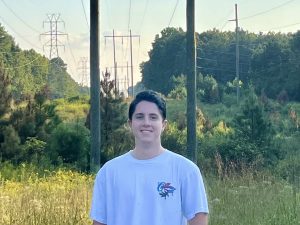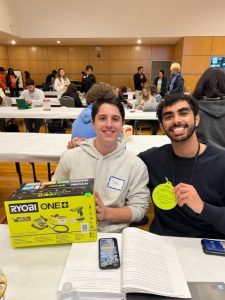Jake Otte has been building the skills he needs to launch his career as an electrical engineer throughout his time at UNC-Chapel Hill. When he graduates in May, he will be ready.
Otte will use skills he has gained through courses in the applied sciences and engineering (APSE) minor offered by the department of applied physical sciences as he continues his work as an electrical engineer at Kiewet, one of North America’s largest and most respected engineering and construction organizations.

“APSE offers an applied engineering education that complements what I learn in my physics courses,” Otte, a physics major, explains. “Physics gives you very strong problem-solving abilities and sense of procedural analysis of a problem, and APSE provides more knowledge and scenarios that relate directly to what you might face when you work in the industry.”
Students gain a comprehensive background in technical skills and an entrepreneurial mindset by completing courses in the APSE minor. Someone with an entrepreneurial mindset approaches problem solving through a lens of curiosity, making connections and creating value.
These tenets encourage engineers to identify opportunities and create solutions for real-world impact. By combining curiosity and team-based science, the entrepreneurial mindset applies technical content to achieve meaningful impact beyond the classroom and prepares engineering students like Otte for their careers.
Indeed, Otte notes that the APSE minor has given him a competitive edge in addition to critical industry knowledge.
“The APSE minor has instilled in me an approach I wouldn’t have found elsewhere,” he explains. “Some engineering and technical skills – like client coordination – can be learned via internships. But skills embedded in entrepreneurial thinking like problem solving, communication and collaborating toward positive change are extremely helpful in preparing for an engineering career.”
Otte served as an engineering intern at Kiewit during summer 2022. Now he works remotely for the company as an electrical engineer, wiring circuits for instrumentation and equipment. During his internship and now as a remote worker, Otte is seeing firsthand the value of the APSE coursework to enhance his effectiveness in the workplace.

Specifically, Otte reflects on how the APSE minor has introduced him to relevant engineering concepts that he might not know otherwise. For instance, he mentions he is currently enrolled in a course called “Developing Your Sixth Sense: Designing Sensors and Electrical Circuits to Make Measurements.”
“In this class, we learned about electronic sensors and the function of thermocouple circuits,” Otte said. “I wouldn’t have such in-depth knowledge of this area of engineering without this class.”
At BeAM MakerFest, an annual event that invites to students to present their ideas and prototypes from research or entrepreneurial efforts, Otte showcased his engineering and entrepreneurial skills in action.
“MakerFest requires you to envision, design and create a solution to a challenge,” Otte describes, adding that these steps are essential in professional engineering roles.
His team’s product, an electrical silverware drying device, won the RYOBI Innovative Maker Award, which recognizes a prototype that provides a thoughtful solution to a real-world problem and was made with handheld BeAM tools.
“MakerFest was interesting because the process to develop a project was similar to what I do for my job,” Otte adds. “You must take initiative, gather a team and work together to communicate what you want for the final product. Everyone can then complete their own critical part of the project while maintaining communication throughout. This process of communicating, planning and developing a solution for MakerFest mirrors the industry process very well.”
Otte praises APS faculty members Richard Goldberg and Nico Pégard for their mentorship and expertise.
“Learning from professors who are real industry engineers is so valuable,” he says. “I wish I would have begun pursuing this minor sooner.”
Ottes’ next step is to take the Fundamentals of Engineering exam to achieve certification as a licensed engineer.
“The APSE minor prepares you in a meaningful way for this exam,” Otte says. “The courses familiarize you with key concepts and are a good pathway to successfully prepare for certification.”
With this certification, Otte plans to continue working as an electrical engineer after his graduation from Carolina.
“For those who want to enter a career in engineering, I would recommend taking the APSE minor alongside another STEM-heavy major,” Otte advises. “It is important to understand your role within a team and always apply initiative, especially when it comes to creating projects and furthering ideas. I think APSE does that much better than anything else I have found at UNC.”
By Sarah Auerbach, Applied Physical Sciences
